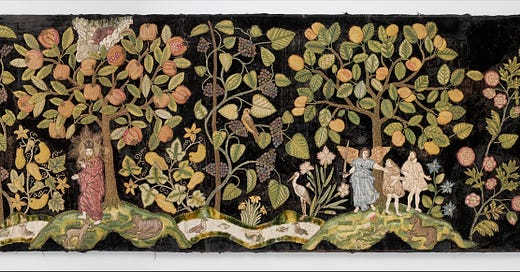Some of us were born into the world where there was food.1 Food was good. It sustained all the people that came before us. We grew up knowing what food was. Where it came from. Where to find it. How to prepare it. How to eat it. When to eat it. What food goes together with other food. How it affects us. Food exists within limits of a place, time, and the people who make some sense of it. As times and places change, so does food. We change our ways to adjust. Yet the general concept of what food is stays constant. It is not healthy. It is not unhealthy. It is. Food is good.
We live at the time when it can be argued and scientifically proven that food, as we know it, is insufficient or bad for our health. To save ourselves, we are told, we must resort to scientifically engineered “food” and supplemental drugs (aka vitamins and supplements) to ensure our health and survival. What is asked of us is to denounce food. We are asked to denounce what is good.
Here a question arises: if we accept as the truth that food is deplete and will bring our demise, must we eat ersatz to be healthy? Many will. No health will come of it. We must denounce ersatz as evil. Reckless development of technology and inappropriate use of a scientific method in a world that orients itself towards material needs using money as a compass leads to conclusions that turn the world as we know it not even upside down but backwards. When you do not know good from evil, eating excrement to be healthy will seem like a good idea.2
Food is a distinct entity from industrially produced junk/garbage that is commonly known as “food” in the West. In this mentality, what used to be food since time immemorial becomes a desirable albeit an unnecessary option - “healthy food” (aka “real food”). It is a good practice to call what is not food what it is - garbage.
Drbeen Medical Lectures. Microbiome talk with Dr.Hazan 6:50. A talk of a business minded physician whose goal is to develop commercial treatments and pharmaceuticals based on stool cultures to cure diseases that are caused by a host of factors from governmental policies, research direction, medicalized thinking about food, disturbed farming practices, industrial food substances production, imploded local food cultures, birth practices that hamper maternal flora and prevent colonization of newborns with normal bacteria during medicalized hospital birth, and disrupted by the use of technology (breast pumps and freezers) nursing at the breast or formula feeding that damages gastrointestinal tract lining and deviates GI tract flora from normal to abnormal with introduction of non-maternal milks, rampant antibiotic use and other drugs that disrupt normal GI tract function. All of that causes a cascade of effects across all body “systems” of an infant and later adult. Consult Lawrence, R., Lawrence R. (2021) Breastfeeding: A Guide for the Medical Profession for an imperfect take on breastfeeding and its effect on health. Nursing at the breast is not a therapeutic health practice. It is a loving relationship between two people - a mother and her child.
Most of the research is about breastmilk not nursing at the breast. The context of mining breastmilk for useful therapeutic agents. Human Milk Patenting blog by Valerie McClain elaborates on these issues.
Research paradigms go through fads every so many years. Microbiome fad replaced vitamin D fad.
It is incorrect to think of a man (aka as human) as a microbiome. You are not any more microbiome as you are not an immune system. This is a perverse way of thinking of men (aka people). You are not feeding or fixing a microbiome. You eat for youself, for sustenence and pleasure. How you feel during and after eating can be a decent way to understand how food affects you.
Our fixes arise within a culture of cerian ideas and values. We think health is something you buy not something you do. Walleston, Aimee. The Eternal Sick Day.
Illich, Ivan. Medical Nemesis. “All traditional cultures derive their hygienic function from this ability to equip the individual with the means for making pain tolerable, sickness or impairment understandable, and the shadow of death meaningful. In such cultures health care is always a program for eating, drinking, working, breathing, loving, politicking, exercising, singing, dreaming, warring, and suffering.
Some of the afflictions mentioned in the presentation respond well to modifications in what a sick man eats (whatever happens inside follows, not the other way around). “The importance of food in medicine was recognized in the 5th Century BC by Hippocrates of Cos, who is considered the father of Western medicine. His work was compiled either directly or indirectly through his disciples, so that the existing knowledge on Hippocrates’ medicine consists of more than 60 texts known as The Hippocratic Corpus (Corpus Hippocraticum). This important text in the history of medicine expounds on the theory of diet. However, the phrase “let food be thy medicine and medicine be thy food”, a widespread phrase quoted by today’s scientists, is nowhere to be seen. This literary creation is not only a misquotation but it also leads to an essential misconception: in the Hippocratic medicine, even if food was closely linked to health and disease, the concept of
food was not confused with that of medicine. (emphasis mine)
Cardenas, D. (2013). Let not thy food be confused with thy medicine: The Hippocratic misquotation. e-SPEN Journal, 8(6), e260–e262. doi:10.1016/j.clnme.2013.10.002
I can’t think of the one-two punch effect of technology literature right this moment. You can explore the subject of one technological fix leading to a cascade of more and more fixes. You become worse off, not better.



